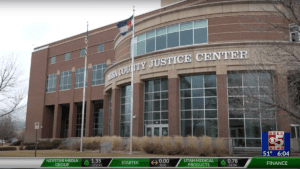Weekly Roundup – Immovable Object
Recap and analysis of the week in state government
JAN. 14, 2022…..One senior Beacon Hill Democrat told Gov. Charlie Baker this week that the state needed him “to be more present” as it grapples with the latest COVID-19 surge. The governor’s presence, however, was about all they got.
With every conversation of late beginning and ending with COVID-19, the governor’s appearance on Tuesday before the Joint Committee on COVID-19 and Emergency Preparedness and Management had marquee billing.
But if lawmakers thought they were going to bully Baker into having an aha moment on masks, remote learning, or anything else, they found out pretty quickly that the governor wasn’t there to appease them.
The quip about being more present came from Sen. Cindy Friedman, and if Baker had a chance to respond he might not have done so kindly. It was one of several moments during the course of an oversight hearing where friction between the executive and legislative branches over the response to the omicron wave was on display.
The governor did not waffle in his opposition to a statewide mask mandate, his belief in in-person schooling, or his defense of efforts to provide access to testing, noting at one point this week that, lines notwithstanding, the state has as much testing capacity “as you find anywhere in America.”
“Today we didn’t move the needle on some of those mandates as I hoped we would,” committee co-chair Sen. Jo Comerford said.
Baker preempted some lines of questioning from lawmakers by rolling out major announcements in the days and hours before his appearance, starting with the launch of a digital vaccine card that vaccinated residents can download and store on their phone to more easily show proof of how many shots they’ve received.
He would go on to activate 500 additional National Guard troops to assist with staffing at overrun hospitals, and detailed a state purchase of 26 million new rapid COVID-19 antigen tests that would be prioritized in the coming months for K-12 schools and daycare centers.
The vaccine “passport” program draws from the state’s Massachusetts Immunization Information System, and while many users found it easy to use after the launch, there remain some gaps, including records of shots for border dwellers who may have gotten one or more of their shots out-of-state. Veterans also reported trouble as vaccines administered by Veterans Affairs clinics were not fully uploaded to the state database.
The governor showed, however, he’s not completely rigid in his thinking as he became the first in 25 years to agree to commute the sentences of two men serving life sentences for murder. In his last year as governor without the prospect of a Republican primary, Baker recommended the commutation of the sentences of William Allen, 48, and Thomas Koonce, 54, to second degree murder, which would make both eligible for parole.
It’s not unusual for governors to wait until their final year in office to consider pardons and commutations given the political sensitivity around such actions, and it’s possible these won’t be his last.
“I believe both men, having taken responsibility for their actions and paid their debt to the Commonwealth by serving sentences longer than most individuals found guilty of similar actions, deserve the right to seek parole from prison,” Baker said.
If released, Allen and Koonce will enter a society that looks a lot different than the one they knew before prison.
The same week that the Supreme Court struck down President Joe Biden’s vaccine mandate on large private businesses, Boston was preparing for the Saturday start of a new mandate in the city requiring patrons of restaurants, fitness centers and entertainment venues to show proof of vaccination to enter.
Brookline took a similar step this week to begin requiring vaccinations at certain establishments, but by and large municipalities have been slow to adopt similar policies, even in places like Somerville and Cambridge where there is some official support for such a policy.
Vaccines aren’t required for school employees or students, but Education Commissioner Jeff Riley got the week started by announcing an extension through February of the policy requiring teachers, students and staff in schools with vaccination rates below 80 percent to mask up.
“I’m not going to let people perpetuate this idea that schools aren’t safe, because they are and it’s been proven not just in Massachusetts but in the U.S. and around the world for the better part of a year and a half,” Baker told the COVID-19 oversight committee, despite infection rates reported by schools remaining elevated, with 41,063 students cases and 7,351 school staff cases during the week of Jan. 6 to Jan. 12.
As for elevated levels, people looking for silver linings in the current pandemic resurgence found it in the sewer. Boston-area wastewater testing this week showed that while traces of the virus remain well above summer lows, levels are starting to come down.
Also coming down this week? Tents.
Boston Mayor Michelle Wu’s administration cleared the area of Mass. Ave. and Melnea Cass Boulevard of makeshift shelters and referred 154 people to alternative housing without making any arrests. The effort was part of the city’s attempt to address the problems of homelessness and substance use among those living on the streets.
Wu also visited with Senate President Karen Spilka at the State House on Thursday where the Senate was back in action, holding the first substantive session for either legislative branch since returning from the winter break for the new year. On the docket were two bills to make state ID cards more accessible to homeless residents and to repeal a prohibition on adults adopting younger siblings, aunts or uncles.
Boston Mayor Michelle Wu embraces Senate President Karen Spilka after touring the Senate suite Thursday afternoon. Spilka said she let the mayor know “that we’re here to help.” Some of Wu’s top priorities and election promises hinge on Beacon Hill action. [Sam Doran/SHNS]
Both bills (S 2612 and S 2616) passed unanimously 39-0, but if the Senate had waited another week it could have gotten that 40th vote.
Boston City Councilor Lydia Edwards won her uncontested special general election on Tuesday, held under frigid conditions, and next week will take the oath of office as the newest senator from the First Suffolk and Middlesex District, representing Winthrop, Revere and parts of Cambridge and Boston.
The Democrat from East Boston will be the first Black woman to serve in the Senate since Dorchester’s Linda Dorcena Forry, and will join just two other members of color.
The House side of the building was quieter this week, but the Joint Committee on Telecommunications, Utilities and Energy advanced a redrafted offshore wind bill that is a priority for House Speaker Ron Mariano.
The wind bill would soften, but not completely scrap, the price cap on competitive offshore wind projects and proposes new surcharges on utility bills for an offshore wind investment fund. Baker testified this week in support of getting rid of price caps to invite more competition for state contracts, but there is skepticism in the Senate where Sen. Michael Barrett, co-chair of the committee, opposes the elimination of price controls.
If the bill were to pass, consumers could see some increase in their electric and gas bills.
The week also brought another entrant in the race for lieutenant governor. This time it was Salem Mayor Kim Driscoll, fresh off a successful reelection campaign and finally ready to take the plunge into statewide electoral politics that many have long had her pegged for doing.
As for the top of the Democratic ticket, the wait continued for Attorney General Maura Healey to make her decision on the race for governor, but if she does, as expected, get into the race she gave her forthcoming campaign another talking point.
Healey announced a major national settlement reached between student loan servicer Navient and 39 states to resolve claims that the company misled students into unnecessary repayment plans that saddled them with thousands in extra debt.
The agreement, which must still be approved in Suffolk Superior Court, will see more than 1,500 student borrowers in Massachusetts have $41 million in college debt wiped clean.






